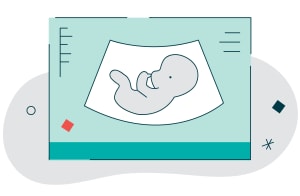Weeks 14 to 18 of Your Pregnancy: Care Instructions
Around this time, you may start to look pregnant. Your baby is now able to pass urine. And the first stool (meconium) is starting to collect in your baby's intestines. Hair is starting to grow on your baby's head.

You may notice some skin changes, such as itchy spots on your palms or acne on your face.

At your next doctor or midwife visit, you may have an ultrasound. The ultrasound allows your doctor or midwife to check that your baby is developing and growing. The ultrasound shows that the large organ that develops in the uterus during pregnancy and is connected to your baby by the umbilical cord (called the placenta) is working well. Also ask your doctor or midwife about influenza (flu), Tdap and COVID-19 shots.

How to reduce stress
- Ask for help when you need it.
- Try to avoid things that cause you stress.
- Seek out things that relieve stress, such as a warm bath or yoga.
- Talk to your doctor or midwife about ways to help you cope with mood changes in pregnancy.

How to get exercise
- If you don't usually exercise, start slowly. Short walks may be a good choice.
- Try to be active 30 minutes a day, at least 5 days a week.
- Avoid activities where you're more likely to fall.
- Use light weights to reduce stress on your joints.

How to stay at a healthy weight for you
- Healthy weight gain in pregnancy is different for everyone. The average recommended weight gain is about:
- 0.5 kilogram (1 pound) a month during the first 3 months of your pregnancy
- 0.5 kilogram (1 pound) a week during your last 6 months of pregnancy
- 11 to 16 kilograms (25 to 35 pounds) during your whole pregnancy
- If you’re underweight, it’ll be helpful to gain more weight (about 13 to 18 kilograms or 28 to 40 pounds).
- If you’re overweight, you may not need to gain as much weight (about 7 to 11 kilograms or 15 to 25 pounds).
- If you’re pregnant with more than 1 baby, your weight gain recommendations will be different. Talk to your doctor or midwife about your needs.
- If you think you’re gaining weight too fast, keep a food diary and talk to your doctor or midwife about your concerns. Try to exercise every day, and limit sweets, fast foods, and fats. Choose lean meats, fruits, and vegetables.
- Ask your doctor or midwife about meeting with a dietitian or nutritionist if you need help with healthy eating and weight gain in pregnancy.
Follow-up care is a key part of your treatment and safety. Be sure to make and go to all appointments, and call your healthcare provider or nurse advice line (811 in most provinces and territories) if you are having problems. It's also a good idea to know your test results and keep a list of the medicines you take. You can get some of your test results if you have a MyHealth Records account.
Where can you learn more?
Go to https://www.healthwise.net/patientEd
Enter I453 in the search box to learn more about "Weeks 14 to 18 of Your Pregnancy: Care Instructions".
Adaptation Date: 06/12/2024
Adapted By: Alberta Health Services
Adaptation Reviewed By: Alberta Health Services
